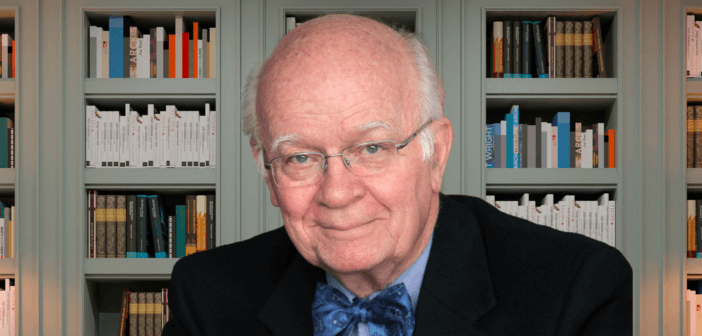Widely regarded as the foremost religious scholar of his time, Martin Marty’s legacy extends beyond his prolific writing and lectures to his profound impact on how we think about faith, leadership, and community. Marty’s approach, grounded in his Lutheran faith, exemplified the power of humility, respect, and dialogue in addressing the challenges of religious pluralism. In this article, Lovett Weems reflects on the values that defined Marty’s work and explores how his life offers crucial lessons for Christian leaders today.
It is hard to learn of the death of someone who seems part of the universe as much as land and sea. Martin Marty’s death at 97 came after one of the most prolific and profound lives imaginable. Time magazine said he was “generally acknowledged to be the most influential living interpreter of religion in the U.S.” But his prodigious output of lectures, books, articles, and commentary was matched by being an unpretentious man of faith who treated everyone with dignity and respect. While a historian, he always conveyed an approach to his work and writing that has significant implications for leadership.
Simple is better than complex.
Marty’s son Peter wrote a beautiful tribute to his father in which he noted that “Dad had a knack for translating complex ideas into graspable takeaways for diverse audiences.” That is one reason so many invited him to speak, read his books, and relied on him to assess happenings in the world. He showed the gift of thorough knowledge combined with enough respect for his audiences to convey information that fit their needs.
Don’t repent for other people’s sins.
An unfortunate tendency among religious folks is for us to focus on the shortcomings of others while ignoring failures of our own. Marty was at his best when he punctured, usually with humor, the balloons of the self-righteous and hypocritical. Whether speaking of evangelicals, mainliners, or Catholics, he used history to remind all of us of our compromises and shortcomings, thus serving to temper the arrogance and judgementalism so prevalent among many religious leaders.
We are often part of the problem.
When asked once about violence perpetrated around the world in the name of religion, Marty said, “When God gets called in, things get worse.” He went on to say that “when people become convinced they’re acting on God’s orders, it gives them an excuse to be less humane.” While that is just the opposite of what religious leaders like to think, today in the United States we can see how those carrying the banner of religion, including Christianity, are responsible for actions counter to any concept of love. Where there is no love, God is not honored.
Faithfulness and respect for difference are compatible.
As someone deeply shaped by and embedded in his Lutheran faith, Marty was at the same time one who explored the religious pluralism of the nation and world with respect and integrity. In a country quickly changing racially, culturally, and religiously, any hope for true community will require Christians and persons of other faiths to find ways to unite on behalf of the common good.
Related Resources
- The Leader as Communicator by Lovett H. Weems Jr.
- Leaders Stay Connected by Margaret J. Marcuson
- 4 Characteristics of Citizens of the Kingdom of God Who Inhabit the Political World by Miranda Zipor Cruz
If you would like to share this article in your newsletter or other publication, please review our reprint guidelines.
Images courtesy National Catholic Reporter and freepik







